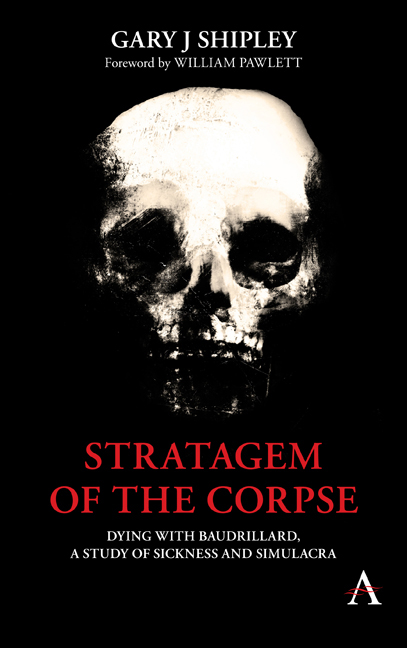Book contents
- Frontmatter
- Dedication
- Contents
- Acknowledgements
- Foreword by Pawletts William
- Introduction
- Chapter 1 On Decay and Other Synthetics
- Chapter 2 Stratagem of the Corpse
- Chapter 3 A Bleak Non-History of History
- Chapter 4 The Hyperactivity of Objects
- Chapter 5 The Unnamable Catastrophe
- Chapter 6 A Cure for Vertigo
- Chapter 7 Chance and the Temporality of Death
- Chapter 8 The Possibility of Nihilism
- Chapter 9 Smell-O-Vision: The Murder Show
- Chapter 10 The Evil Death
- Chapter 11 False Confessions and the Madness of Death: Making Death Speak
- Chapter 12 Black Light: Nigredo and Catastrophe
- Appendix 1 Whiteout: Spatiotemporal Interstices, Necropresence and the Immortality of Now
- Appendix 2 Pure Dreaming: Radicalized and Vermiculated Thought, or Death as an Earworm
- Appendix 3 The Non-Existence of the Scream
- Index
Appendix 2 - Pure Dreaming: Radicalized and Vermiculated Thought, or Death as an Earworm
Published online by Cambridge University Press: 20 February 2020
- Frontmatter
- Dedication
- Contents
- Acknowledgements
- Foreword by Pawletts William
- Introduction
- Chapter 1 On Decay and Other Synthetics
- Chapter 2 Stratagem of the Corpse
- Chapter 3 A Bleak Non-History of History
- Chapter 4 The Hyperactivity of Objects
- Chapter 5 The Unnamable Catastrophe
- Chapter 6 A Cure for Vertigo
- Chapter 7 Chance and the Temporality of Death
- Chapter 8 The Possibility of Nihilism
- Chapter 9 Smell-O-Vision: The Murder Show
- Chapter 10 The Evil Death
- Chapter 11 False Confessions and the Madness of Death: Making Death Speak
- Chapter 12 Black Light: Nigredo and Catastrophe
- Appendix 1 Whiteout: Spatiotemporal Interstices, Necropresence and the Immortality of Now
- Appendix 2 Pure Dreaming: Radicalized and Vermiculated Thought, or Death as an Earworm
- Appendix 3 The Non-Existence of the Scream
- Index
Summary
The recurring prospect of death is silent music, soundless sound, an intrusive tune not heard but thought, its infinite capacity for return rendering us deaf and indifferent to all but the thinking of death's lost musicality. We are not making our way towards death, death is making its way towards us, for the umpteenth encounter, a series of events awaiting the event. We are not returned from the dead, but are instead the conduit through which death makes its perpetual return: not zombies but hosts for a vermicular hoard of zombified reprisals. Our task is to feel these earworms bite, to become sensible to their gnawing presence in our ears and in the soft tissue of our brains, to reverse the process of digestion, to feed on them as they feed on us. Death's haunting fugue is no longer haunting, and it's no longer a fugue: it is instead an advertising jingle selling us back our dreams made full and productive, selling us the death of death.
While a question remains as to its susceptibility to use (whether its uselessness can be put to work), like death, or as death, the earworm is recursive, negative, unpurposive, spontaneous, valueless, dysfunctional, abstract, uncommunicative, non-narrative, directionless, autistic, mute, and therefore potentially unrestricted, potentially free. Having ascertained such a comprehensive list of negative freedoms, there remains the question as to whether they might equate to any kind of positive freedom: with so much removed it is at best unclear whether there is enough left to exact anything but that negativity. Are these worms of the dead free to do anything but feed on the dead? That there may be some radical use for the earworm's uselessness (and so for death's uselessness) is central to any consideration of worms and the vermicularity of death that does not pass over how the worm is not only a tunnelling organism but is itself the embodiment of a tunnel, a routeless route, a conveyance to extremity and in extremis: ‘Freed of curiosity, of forecasting tomorrow and contemplating yesterday, unburdened by knowing or caring, the thought that an earworm is becomes free to be useless, free to deploy itself as radical thought, to be more of what thinking is.’
- Type
- Chapter
- Information
- Stratagem of the CorpseDying with Baudrillard, a Study of Sickness and Simulacra, pp. 187 - 198Publisher: Anthem PressPrint publication year: 2020



